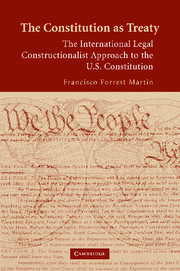 The Constitution as Treaty
The Constitution as Treaty Book contents
- Frontmatter
- Contents
- Prologue
- Introduction
- PART I UNITED STATES COURTS AS INTERNATIONAL COURTS
- PART II INTERNATIONAL LAW
- PART III UNITED STATES LAW AS INTERNATIONAL LAW
- 5 Article III, International Legal Interpretation
- 6 Extra–Article III, International Legal Interpretation
- 7 The General Liberal Construction Rule: Extending Lynham to Other Article III and Extra–Article III International Law
- Conclusion
- Epilogue
- Index
6 - Extra–Article III, International Legal Interpretation
Published online by Cambridge University Press: 27 July 2009
- Frontmatter
- Contents
- Prologue
- Introduction
- PART I UNITED STATES COURTS AS INTERNATIONAL COURTS
- PART II INTERNATIONAL LAW
- PART III UNITED STATES LAW AS INTERNATIONAL LAW
- 5 Article III, International Legal Interpretation
- 6 Extra–Article III, International Legal Interpretation
- 7 The General Liberal Construction Rule: Extending Lynham to Other Article III and Extra–Article III International Law
- Conclusion
- Epilogue
- Index
Summary
Article III states in relevant part:
The judicial Power shall extend to … – to all Cases affecting Ambassadors, other public Ministers and Consuls; – to all Cases of admiralty and maritime Jurisdiction; – to Controversies to which the United States shall be a Party; – to Controversies between two or more States; – between a State and Citizens of another State;[] – between Citizens of different States, – between Citizens of the same State claiming Lands under Grants of different States, and between a State, or the Citizens thereof, and foreign States, Citizens or Subjects.
These jurisdictions often are “non-federal law claims” jurisdictions, and Article III does not require a party to plead a federal law claim for the federal courts to exercise jurisdiction. Article III's party-based, admiralty, and maritime jurisdictions implicate international and interstate relations – areas in which international law clearly is material to their proper operation and organization. To understand these jurisdictions, one must construe them in light of the Preamble's object and purpose to ensure “domestic Tranquility.” Recall that in Chisholm v. Georgia, Justices Wilson and Cushing used the Constitution's object and purpose “to ensure domestic Tranquility” for ensuring that interstate armed conflicts do not result from interstate disputes. Disputes can arise between states (or their citizens), between the states (or their citizens) of the United States and foreign states (or their nationals), or between the United States and foreign states resulting in interstate or international armed conflicts.
- Type
- Chapter
- Information
- The Constitution as TreatyThe International Legal Constructionalist Approach to the U.S. Constitution, pp. 148 - 201Publisher: Cambridge University PressPrint publication year: 2007


